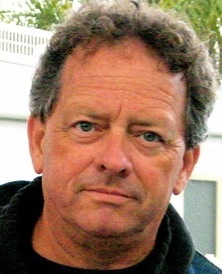Social Entrepreneurship
Sometimes you find yourself in one of those conversations that redefines your thinking. This week it happened to Peggy and me. It was a conversation about something called "social entrepreneurship." I had not heard that term before, but now that I have, I can't get it out of my head. So what is social entrepreneurship? The introductory paragraph in the Wikipedia article about it says this:
"Social entrepreneurship is the recognition of a social problem and the uses of entrepreneurial principles to organize, create and manage a social venture to achieve a desired social change. While a business entrepreneur typically measures performance in profit and return, a social entrepreneur also measures positive returns to society. Thus, the main aim of social entrepreneurship is to further broaden social, cultural, and environmental goals. Social entrepreneurs are commonly associated with the voluntary and not-for-profit sectors, but this need not preclude making a profit."
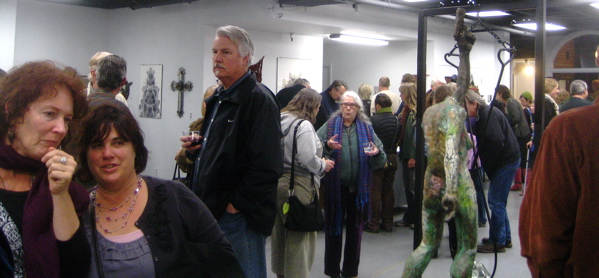
As I ponder the implications of that paragraph, it occurs to me that we are engaged in social entrepreneurship around here on several fronts and didn't have a name for it. The Phantom Project is a good example. There is a need in our area for more venues in which artists can display their work. We felt this need personally before the Phantom Project began, but were still incredulous when we saw the overwhelming response to our first two shows. Phantom sidesteps all the usual barriers and hurdles to putting up a gallery show, and appropriates the good will and resources of local retail property owners and armies of volunteers and participants to put art exhibits in vacant space. The timing is fast, the energy is high, and in our first two shows we have found green lights and greased skids every step of the way. The whole local art community understands this need and has proven eager to help. The art establishment has been overwhelmingly supportive, as has been the larger community, because we have been inclusive, have shared credit, and been extremely flexible. The shows are an extraordinary amount of work to do, but the benefit to us and to the community are equally remarkable.
Another great example of social entrepreneurship is Jason Kelly's Socks for Japan. The social value of this idea was so strong, and so clear, that within hours of inception it was up and running, and within a few months, had engaged volunteers and donors from all over the world.
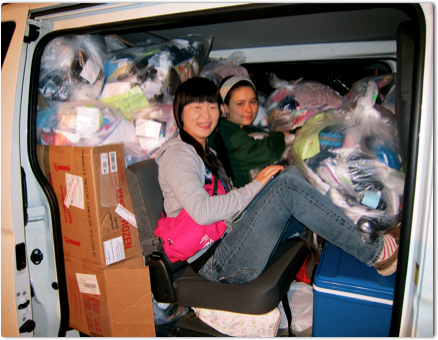
Typically we think of social entrepreneurship as the native territory of nonprofit and volunteer organizations, and it is crucial to such endeavors. But as the Wikipedia quote states, there is nothing that should preclude other ventures from utilizing these principles. Any project is strengthened when it has social value beyond the profit motive. One of the most important and powerful ways to energize the market for an idea is to tap into the social values that propel the idea. There are several things that can happen when your endeavor has transparent social value beyond your business plan.
People get personally engaged. They identify with your project because they like what it gives to society. They can easily see themselves as part of it, and it provides them with a sense of participation and ownership. They are more willing to support it financially or otherwise when they are inspired by it.
Your project gains acceptance and trust. Nothing breeds suspicion more than naked capitalism. If people get the sense that you are just out to make a buck, it becomes a very cold calculation of whether or not they will profit directly and proportionately to what you charge. But the equation changes when what you offer has a genuine benefit to society that is not easily measured in cash. The degree to which you can leverage this intangible value is about what that value is, and about how well you convey it to your public, and about your commitment to it. This is not something that can be faked, but it is important to understand the value of clear, effective communication in conveying your vision.
I am pretty confident that those of you who take time to read Outside the Lines are concerned with the social value of what you offer to those who engage your work. It makes a lot of sense to take some time to consider what that value is. If you already have an explicit understanding of this, how well do you communicate it to your public? If this is a new thought for you, what is that value? How can you express it clearly and in ways that will draw your public into a closer engagement? This is not just about sales, although improved sales are likely as you get a clearer grasp of the social value of your offering. It's also about engagement and enthusiasm and loyalty from those who understand and follow what you do and why you do it.

I encourage all of our readers to examine how your creative vision benefits your community. Look for ways to convey this value more clearly. Examine the strategies and tactics that you employ in your business and ask yourself how well they are aligned with your core values. Look for ways to bring your business practice in line with those core values. Especially look for the places where you have allowed yourself to get sidetracked with things that seem urgent but are not in line with those values.
Peggy and I are taking time to do this very thing with Outside the Lines, with Windhook, and with our art. We have always had a strong sense of the social significance of the work we are doing to foster creativity and community in and around the arts. But sometimes maybe we have put it on autopilot. Sometimes we have allowed daunting circumstances to shift our focus too much toward the obstacles and tactics to overcome them. Look for more on this as we grow into this concept of social entrepreneurship!
Start Living the Life You Love
By Linda Waldon

Fall in love with yourself.
Nurture your body with love, nutritious food, and exercise.
"I fall asleep feeling beautiful," she said to me. "Then, in the morning, before I leave the house I say five things I love about myself, like, I have really pretty eyes, or, those sit-ups are really working!" That way I can go out into the world with that little bit of extra confidence. It's a feel-good protein shake that fortifies my soul in case someone messes with me."
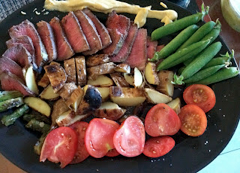
Try eating mostly vegetarian for one week. See how creative and fun it is to fill your shopping cart with colorful vegetables and then roast, stir fry, steam, or eat vegetables raw. This plate is 3/4 vegetables with roasted potatoes and asparagus, heirloom tomatoes, sweet peas, asparagus, and sliced hormone-free beef tenderloin filet, served with Dijon mustard for zing.
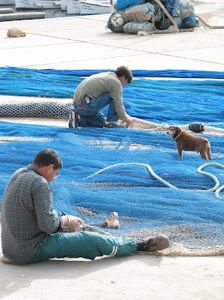
Love your job with all of your heart. Have pride in it, do it 100%, and keep growing in it. If you hate your job, change it. Start something new, create it, market it, perfect it, and love it with all your being.
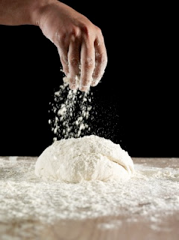
Build the life you desire by starting with small 'dough ball' changes so it's not so overwhelming. For instance, if you're a writer, a colleague of mine, Adele Sommers, recommends writing small metaphorical dough balls of content that you can stack in the freezer to be pulled out later when you are ready to create something like a book or workshop. By creating small dough balls one at a time, you are not faced with preparing ten loaves of bread all at once, and the task doesn’t feel so overwhelming.
This also applies to lifestyle changes, and your dough balls could be things like starting to walk for twenty minutes every day, cutting out soft drinks, or writing short stories that will one day turn into a novel. The point is to start out with small accomplishments that turn into the life you love. What begins with a dough ball could end as a multi-tiered wedding cake!

Is your image helping or hurting you?
What does your image say about you? Think about the last time you met someone for the first time. What kind of impression did you make? Some say it's wrong to 'judge a book by its cover.' Yet we all do it. For good reason! Our tribal ancestors had a few seconds to judge whether a stranger was friend or foe. If they judged incorrectly, they were dead within seconds! We evolved this ability to judge quickly, mostly based on a stranger's size and clothing. The size thing is obvious, and the clothing indicated whether he or she was a member of the tribe. Clothing still plays a significant role in our first impression—the way you dress tells the world how you feel about yourself, so show the world you care.
Your image on social media is also important. Social media gives you a voice. Use it wisely. It is a powerful connection to the world. Become a thought leader and change the world one thought at a time.
Pay attention to your personal brand. Everything you say and do reflects who you are.
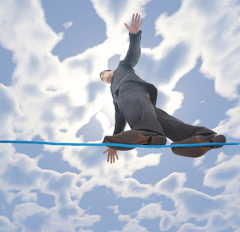
Create balance in your life by nurturing personal relationships, taking breaks and vacations often (short 1-day excursions revitalize your spirit), and by fitting exercise and quiet time into your daily schedule.
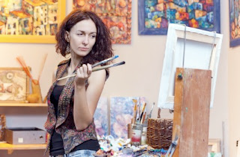
Enjoy the arts. Go to free concerts, attend art openings at your local galleries, take an art class even if you cannot draw a circle, or learn how to throw pots. Here's my sister, pictured below, throwing a pot for the first time. She has always talked about getting a hobby, and one day suggested maybe she'd like to learn ceramics. So, this summer, while we were visiting a pottery store, the owner asked if anyone would like to try the wheel. I pushed my sister forward and said, "My sister wants to try it!" Reluctantly, she sat down at the wheel, and proceeded to create a very nice vessel.
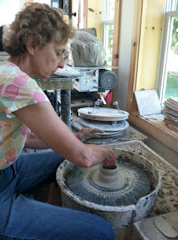
Stop thinking, start doing!
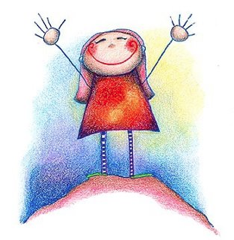
Our monthly radio show: Designing a Creative Life
|














